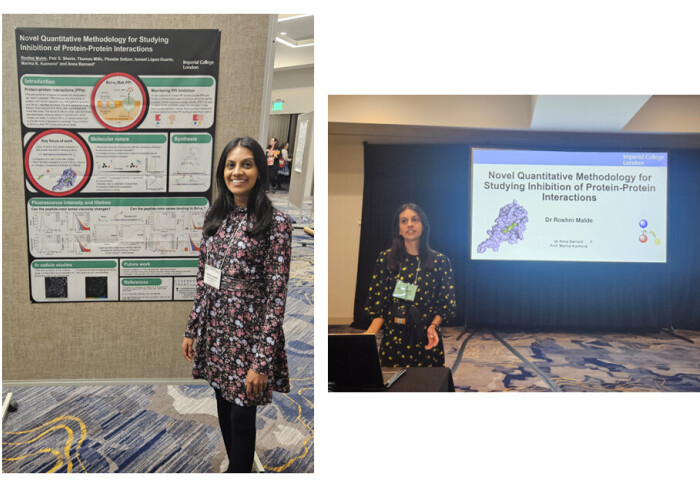Roshni presents at Gordon Peptide Conference 2024
by Anna Barnard

Dr Roshni Malde has presented her research on molecular rotors at this year's Gordon Conference on the Chemistry and Biology of Peptides.
Roshni presented her research at the 2024 Gordon Conference on Peptides held in Ventura, California. She gave both a talk and a poster at this year's event. Dr Malde's work is focused on the development of novel quantitative technology for monitoring the inhibition of protein-protein interactions using molecular rotors.
Protein-protein interactions (PPIs) are central to biological processes, but their deregulation can result in diseases. A significant challenge faced is the ability to monitor PPI binding and inhibition in real-time in complex cellular environments. Current techniques include the plate-based ELISA and SPR, requiring protein immobilisation; whilst the more native-like approaches include fluorescence polarisation (FP) and Förster resonance energy transfer (FRET). Although FRET is utilised in cellulo, its complexity lies in the requirement to label both protein coupling partners. There is therefore a need for alternative methods to monitor PPI inhibition.
Roshni reported on the conjugation of a small fluorophore to a known Bcl-xL binding Bak peptide which results in an increase in fluorescence intensity upon binding between the Bak conjugate and Bcl-xL. Furthermore, we note that the Bak conjugate shows an increase in fluorescence lifetime upon binding to Bcl-xL, which we envisage provides a unique concentration-independent method for quantitative measurements of inhibition intracellularly. The further investigations include investigating a library of peptide-probe conjugates by varying the fluorophore, coupling chemistry, attachment position, and the Bak peptide sequence, to discover molecules with increased cell permeability and to enhance the sensitivity for this novel phenomenon.
Article text (excluding photos or graphics) © Imperial College London.
Photos and graphics subject to third party copyright used with permission or © Imperial College London.
Reporter
Anna Barnard
Department of Chemistry